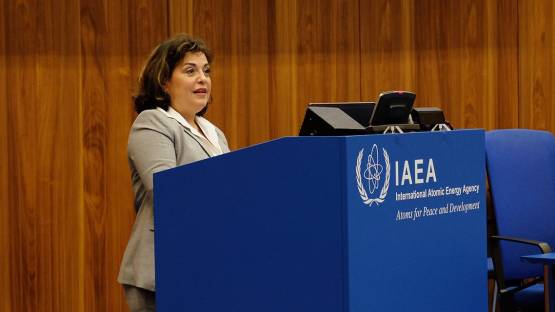March 15, 2021
 Using nuclear technologies, scientists around the globe have been developing improved plant varieties better suited to climatic changes. A new award will celebrate advances in this field. (Photo: IAEA)
Using nuclear technologies, scientists around the globe have been developing improved plant varieties better suited to climatic changes. A new award will celebrate advances in this field. (Photo: IAEA)
Interested individuals or organizations working on using irradiation to breed climate resilient plants have until 31 March 2021 to apply for the Superior and Outstanding Achievement Awards to be granted jointly by the IAEA and the Food and Agriculture Organisation of the United Nations (FAO).
Climate change and the changing weather patterns that come with it have spurred many research teams into action to help farmers adapt to the new climate reality. Using nuclear and associated technologies, scientists around the globe have been advancing plant varieties to become better suited to this changing climate.
Plant mutation breeding involves no genetic transformation but uses a plant’s own genetic resources, mimicking the natural process of mutation, i.e. spontaneous variation. By using radiation, scientists can significantly shorten the time it takes to breed new and improved plant varieties.
Celebrating recent advances in this field, the IAEA and FAO will grant rewards in September 2021 in the following three categories: Outstanding Achievement Award; Women in Plant Mutation Breeding Award; and Young Scientist Award.
“Plant mutation breeding is used in over one hundred countries, contributing to food and nutrition security and farmers’ income,” said Shoba Sivasankar, Head of the Plant Breeding and Genetics Section at the Joint FAO/IAEA Centre of Nuclear Techniques in Food and Agriculture. “By acknowledging the work of scientists in plant mutation breeding and associated biotechnologies, we hope to highlight the importance of induced genetic diversity in improving crop performance and adaptation to climate change.”
The Superior and Outstanding Achievement Awards were last given in 2014 at the 50th anniversary of the Joint FAO/IAEA Programme of Nuclear Techniques in Food and Agriculture.
Maria Caridad Gonzalez Cepero, Leader of Technical Nuclear Applications at Cuba’s National Institute of Agricultural Science (INCA), was recognized in 2014 for her work over 25 years in improving various crop varieties: “This recognition highlighted the peaceful uses of nuclear technologies and the ability of these technologies to benefit farmers and their livelihoods [in Cuba],” she said. “The visibility of this recognition resulted in other institutions throughout the country incorporating these techniques into their own breeding programmes.”
Gonzalez Cepero worked to develop rice varieties demonstrating high salinity tolerance and resistance to Steneotarsonemus spinki − a mite which damages plant tissue. To date, this variety has remained one of the most popular rice varieties in Cuba. Gonzalez Cepero also worked on development of the first three tomato mutant varieties in the country.
With plant mutation breeding techniques, scientists such as Gonzalez Cepero are able to achieve novel genetic diversity in a crop variety which may not be accessible via conventional plant breeding in the same period of time.
Also recognized at the 2014 Superior and Outstanding Achievement Awards was Indonesia’s National Nuclear Energy Agency (BATAN). Having a longstanding partnership, BATAN has been working with the IAEA and FAO since 1997, when the plant breeding programme was first established in the country. To date, more than 35 plant varieties have been developed at BATAN, joining the more than 3 300 plant varieties in the Joint FAO/IAEA Mutant Variety Database.
"Receiving the Outstanding Achievement Award in Plant Mutation Breeding in 2014 meant two things for us,” said Totti Tjiptosumirat, Head of the Centre for Isotopes and Radiation Applications at BATAN. “It was an honor for Indonesia, which was recognized consistently for utilizing nuclear technology for peace and development. And it also represented a new step in the progression of nuclear technology for crop improvement and food security and sharing experiences with other countries in the Asia Pacific region, as shown with BATAN’s designation as an IAEA Collaborating Centre for Plant Mutation Breeding and Climate Smart Agriculture in 2017.”
Find out more on how the Joint FAO/IAEA Centre is using nuclear techniques to support sustainable agriculture worldwide.